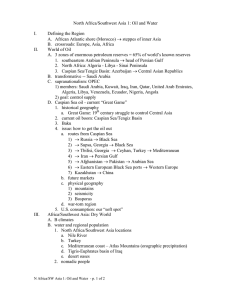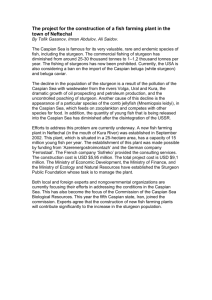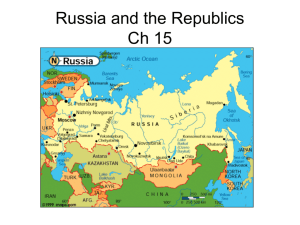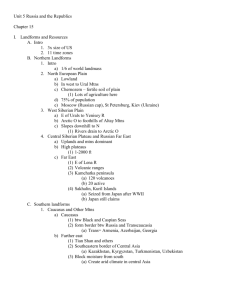Restricted distribution IOC/INF- 114 1 English only
advertisement
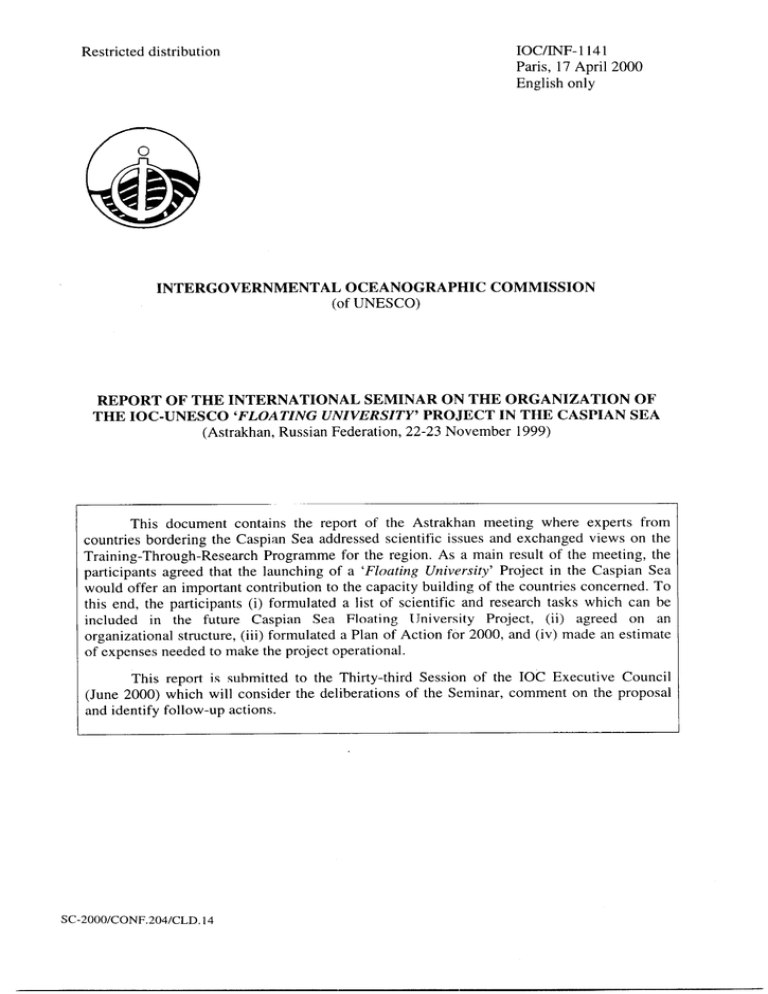
Restricted distribution INTERGOVERNMENTAL IOC/INF- 114 1 Paris, 17 April 2000 English only OCEANOGRAPHIC (of UNESCO) COMMISSION REPORT OF THE INTERNATIONAL SEMINAR ON THE ORGANIZATION THE IOC-UNESCO ‘FLOATING UNIVERSITY PROJECT IN THE CASPIAN (Astrakhan, Russian Federation, 22-23 November 1999) OF SEA This document contains the report of the Astrakhan meeting where experts from countries bordering the Caspian Sea addressed scientific issues and exchanged views on the Training-Through-Research Programme for the region. As a main result of the meeting, the participants agreed that the launching of a ‘Floating University Project in the Caspian Sea would offer an important contribution to the capacity building of the countries concerned. To this end, the participants (i) formulated a list of scientific and research tasks which can be included in the future Caspian Sea Floating University Project, (ii) agreed on an organizational structure, (iii) formulated a Plan of Action for 2000, and (iv) made an estimate of expenses needed to make the project operational. This report is submitted to the Thirty-third Session of the IOC Executive Council (June 2000) which will consider the deliberations of the Seminar, comment on the proposal and identify follow-up actions. SC-2000/CONF.204/CLD.14 IOC/INF- 114 1 The International Seminar was held from 22-23 November 1999 at the Caspian Fisheries Research Institute (KaspNIRKh), in Astrakhan, Russian Federation. This meeting brought together experts from all countries of the Caspian Sea region, Republic of Azerbaijan, Islamic Republic of Iran, Republic of Kazakhstan, Russian Federation and the Republic of Turkmenistan, as well as the representatives of IOC/UNESCO and Germany (Restock University). A total of 24 experts and 26 observers took part in the Seminar (Annex I). Reports to the Seminar addressed activities of the IOCLJNESCO project ‘Floating in the Black Sea (Moscow State University) and the Baltic Sea (Russian State Hydrometeorological University), as well as the proposals of the Caspian Fisheries Research Institute on establishing the regional component of the ‘Floating University’ project in the Caspian Sea. Reports from leading scientists of the littoral countries were heard as well. The Deputy Executive Secretary IOC informed the participants of the IOC activities and the decisions of the Twentieth Session of the IOC Assembly related to the Caspian Sea. The participants were acquainted with the posters prepared by the young scientists of KaspNIRKh. University’ In the course of discussions on scientific reports and the ‘Floating University’ project, the participants stressed the importance and the unique characteristics of the Caspian Sea for the world community. The participants admitted that during the last few years, the Caspian ecosystem was subjected to considerable alterations caused by anthropogenic and natural causes that resulted in increasing eutrophication and pollution of rivers and marine waters. Research studies indicated that further development and expansion of oil and gas exploitation in the region, navigation and illegal fisheries may lead to so much irreversible processes that our generation may witness again an ecological disaster like that in the Aral Sea. The participants unanimously agreed that the IOCYUNESCO ‘Floating University’ project in the Caspian Sea would offer substantial support to the countries of the region. This support would entail ecosystem research, studies and improvement of the methods aimed at sustainable development and management of commercial bio-resources, and would provide assistance to train marine ecologists. Floating 0 0 The participants formulated the following objectives and goals for the ‘Caspian Sea University’ (CSFU) as a training-through-research programme of the Caspian region: The main goal is the upgrading of the scientific and professional abilities of young scientists and specialists in the fields of oceanography and marine. ecology, with the aim of developing co-operation and mutual understanding between countries of the region on such issues as the conservation and rational exploitation of the Caspian natural resources; Scientific objectives of the programme include: Study of the impact of sea-level fluctuations on aquatic and coastal ecosystems, Study of the impact of pollution on ecosystems and living resources under conditions of increased oil extraction from the sea and coastal zones, Study of biodiversity and its conservation in the unique ecosystem of the Caspian Sea, Assessment of changes in species composition and biological productivity of ecosystems in the North Caspian and the Volga Delta, caused by fluctuations of the Caspian sea-level and increased anthropogenic impact, IOC/INF- 114 1 pais 2 Study of the distribution of suspended materials and phytoplankton in sea surface layers using remote-sensing methods for monitoring the marine environment; 0 Implementation of extensive research/training activities for young scientists including practical work, lectures, operating modern oceanological equipment, as well as making them acquainted with modern methods of water chemistry and biochemistry analysis, data management and preparation of reports and scientific papers. The participants agreed that scientific objectives could be reached only on the basis of a complex approach to the solution of hydrological, geochemical, biological, environmental and social problems. The list of applied research problems is given in Annex II. The participants agreed to create the ‘Caspian Sea Floating University’ within the framework of KaspNIRKh activities. The CSFU Executive Board with representatives of all participating countries in the project will be responsible for developing plans of research and training activities, as well as programmes of expeditions. The meetings of the Executive Board are to be held not less than once a year. The management of the project is entrusted to the Project Co-ordinator and Co-ordinating Centre. The organization design of the project is given in Annex III. The project will be funded by the participating countries, the international organizations that agreed to support the project and other sponsors. The annual budget for the project is expected to amount to approximately US$300,000. The budget estimate with reference to the main budget items is given in Annex IV. The participants stressed the importance of a wide information and propaganda campaign, both at the regional and international levels, in order to make the public at large and administrations acquainted with the goals and objectives of the project, as well as with the benefits the countries may receive through the implementation of the project in regard of the sustainable development of the region and the solution of socio-economic problems. The ‘Caspian Sea Floating Universiv’ is open for participation to the representatives of all countries interested in it. It will be executed in different Caspian Sea regions. Experts from bordering countries will be given priority to participate in the expeditions. In order to complete the project and adjust it to the countries needs, the participants agreed to establish an initiative group consisting of: Ivanov, V.P. (Leader, Russia); Belyaeva, V.N.; Mikhailichenko, Yu.G; Tolkachev, A.Ya. (Russia); Kuliev, Z.M.; Salmanov, M.A. (Azerbaijan); Kim, J.A. (Kazakhstan); Shakirova, F.M. (Turkmenistan); Zomorrodian, H.; Alizadeh Lahijani, H. (Islamic Republic of Iran). Taking into account the experience of IOC in organizing and implementing the ‘Floating programme, as well as the experience of UNESCO in science, education and culture, the participants recommended the National Oceanographic Committees and the UNESCO National Commissions in the countries of the region to address UNESCO and IOC’s governing bodies for support to the project. University’ The participants agreed on the Action Plan on the CSFU project for the year 2000, which is presented, in Annex V. IOC/INF- 114 1 Annex I ANNEX I LIST OF PARTCIPANTS Dr. I. Oliounine Director, Deputy Executive Secretary IOC IOC/UNESCO 1, rue Miollis 75015 Paris France Tel: (33-l) 45 68 39 63 Fax: (33-l) 45 68 58 12 E-mail: i.oliounine@unesc.org, Dr. Z.M. Kuliev Director, Azerbaijan Institute Baku Republic of Azerbaijan Tel: (994-12) 66 22 61 Fax: (994- 12) 69 13 43 Fisheries Research Dr. M.A.O. Salmanov Head of Lab., Professor Institute of Microbiology Baku Republic of Azerbaijan Tel: (994-12) 39 23 59 Fax: (994-12) 39 90 89 Dr. H. Zomorrodian President, Professor Iranian National Centre for Oceanography Tehran Islamic Republic of Iran Tel: (98-21) 641 65 56 Fax: (98-21) 641 99 78 E-mail: inco@istn.irost.com Mrs. J.A. Kim Head of Lab., Ecology & Bio-resources KazNIRKh, Atyrau Branch Atyrau Republic of Kazakhstan Tel/Fax: (3 12-22) 29 14 1 Dr. I.V. Mitrofanov Senior Scientist Institute of Zoology Almaty Republic of Kazakhstan Tel: (327-2) 31 23 76 E-mail: igor@miv.almatv.kz Dr. V.N. Zhivago Director, Dept. for Earth & Ocean Sciences Ministry of Science & Technologies RF Moscow Russian Federation Tel: (7-095) 229 03 64 Fax: (7-095) 925 96 09 Dr. A.Y. Tolkachev Secretary, National Oceanographic Committee RF Moscow Russian Federation Tel: (7-095) 229 64 53 E-mail: &lkachev@minstn.ru Dr. M.K. Ivanov Professor, Moscow State University Moscow Russian Federation Tel: (7-095) 939 30 22 Fax: (7-095) 939 49 17 Dr. L.N. Karlin Rector, Professor Russian State University of Hydrometeorology St. Petersburg Russian Federation Tel: (7-812) 444 41 63 Fax: (7-812) 444 60 90 E-mail: Etor@sici.ru Dr. N.L. Plink Dean, Russian State University of Hydrometeorology St. Petersburg Russian Federation Tel: (7-812) 224 21 55 E-mail: p1inkQsici.m Dr. V.F. Brekhovskikh Deputy-Director Institute of Aquatic Problems Moscow Russian Federation Tel: (7-095) 135 54 01 E-mail: vadim@iwapr.msk.su IOC/INF- 114 1 Annex I - page 2 Dr. L.S. Krayushkina Professor, St. Petersburg State University St. Petersburg Russian Federation Tel: (7-8 12) 32 1 32 79 E-mail: kravushkina@usa.net Dr. V.N. Belyaeva Chief Scientist KaspNIRKh Astrakhan Russian Federation Tel: (851-2) 25 76 40 Dr. M.I. Orlova Scientist, Zoological Institute, RAS St. Petersburg Russian Federation Tel: (7-8 12) 328 00 1 I E-mail: omi@zisp.spb.sulecolonv@zin.ru Dr. F.M. Shakirova Senior Scientist National Institute of Deserts, Vegetable & Animal Kingdom Ministry of Nature Ashgabut Republic of Turkmenistan Tel: (993-12) 39 01 14/44 16 77 Dr. N.V. Aladin Head of Lab. Zoological Institute, RAS St. Petersburg Russian Federation Tel: (7-812) 328 46 09/355 64 33 E-mail: aral@zin.ru Dr. A.N. Kosarev Chief Scientists, Professor Moscow State University Moscow Russian Federation Tel: (7-095) 939 22 15 E-mail: kosarev@ocean.geogr.msu.su Dr. V.V. Sapozhnikov Head of Lab., Professor VNIRO Moscow Russian Federation Tel: (7-095) 264 66 85/83 92 E-mail: marecol@dol.ru Dr. V.P. Ivanov Director, KaspNIRKh Astrakhan Russian Federation Tel: (85 l-2) 25 86 36 Fax: (851-2) 25 25 81 E-mail: kaspiy@astranet.ru Dr. L. Debus Scientist, Restock University Restock Germany Tel: (49-38 1) 498 19 54 Fax: (49-38 1) 498 19 52 E-mail:lutz.debus@biologie-uni-rostock.de IOUINF- 114 1 Annex II ANNEX II LIST OF APPLIED SCIENTIFIC TASKS FOR THE ‘CASPIAN FLOATING UNIVERSITY’ PROJECT SEA Carry out continuous remote monitoring in the Caspian Sea to control distribution suspended substances and phytoplankton in the sea surface layer. l of development and Implement field observations of phyto-, zoo-, ichthyo-plankton benthos, and fish bio-cenoses, as a basis for long-term monitoring of typical ecosystems in the Caspian. Study bio-cenotic links between hydrobiont communities. l Study changes in the structure of hydro-front ‘river-sea’ in the northern Caspian, distribution of fish in this area, hydrological-hydro-chemical fields and structure of biocenoses, including bottom one. l Study processes of exchange of ‘live substances’ (organic matter, organisms of flora and fauna, fish) between the northern and middle parts of the Caspian, as well as formation of fish concentrations (kilka, sturgeon and goby) in this area. l Study formation of a zone of hypoxia in the northern and middle Caspian (more precise determination of its borders and factors forming them of the structure of gas components: oxygen, hydrogen, sulphide, etc.). Influence of this process on benthos, fish migrations and production processes and micro-flora. Development of self-purification processes in this zone under conditions of probable oil pollution. l l l l Study ventilation of close-to-bottom water layers in the middle and southern Caspian, mechanisms determining its formation, changes in oxygen content with respect to seasonal (probably to shorter period as well) and inter-annual variations. Study production-destructive Trocesses in aquatic ecosystems, determination of primary dissolved and suspended organic production (concentration of phyto-pigments, substances: proteins, lipids, carbohydrates, nucleic acids), Study dynamics of content of organic and inorganic toxicants in water, bottom sediments and hydrobionts, detection of the most important pollutants. l Implement l Determine technogenic and biogenic origin of hydrocarbons. l l research on integral toxicity of natural seawater by methods of bio testing. Study impact of pollution on structural and functional indices of coastal ecosystems and conditions for their rehabilitation after taking down anthropogenic pressure. Assess bio-diversity and productivity of marine ecosystems; influence of natural and anthropogenic factors on distribution and number of dominating hydrobiont species. IOWINF- 114 1 Annex II - page 2 Elaborate methods of determination of sea capacity for commercially species (sturgeons). valuable fish Implement research of plankton and demersal communities that are formed during flooding of new areas due to sea-level rise. Develop a system. of bio-indicators of ecological state of the Volga Delta and adjacent water bodies at present sea level and taking into account anthropogenic impact. Implement comparative analysis of morpho-functional peculiarities of osmo- and ionoregulation systems of sturgeon Acipenser persicus (Borodin) and A. gueldenstuedti Brandt. Determine ecological euryvalence dynamics in fish ontogeny for choosing optimal times and places to release reared juveniles into natural water bodies. IOC/INF-1141 Annex III ANNEX III ORGANIZATIONAL STRUCTURE OF THE IOCAJNESCO PROJECT: CASPZAN SEA FLOATING UNIVERSITY (CSFU) Executive Board headed by a Project Scientific Co-ordinator Caspian Scientific Research Institute of Fisheries - KaspNIRKh Savuchkina str. 1 414056, Astrakhan, Russian Federation Director: V.P. Ivanov Tel: (851-2) 25 86 36; Fax: (851-2) 25 25 81 E-mail: kaspiy@abstract.ru I CSFU Co-ordinating Centre IOUINF- 114 1 Annex IV ANNEX IV AN ESTIMATE OF FINANCIAL CASPZAN SEA FLOATING RESOURCES UNIVERSITY NEEDED TO IMPLEMENT THE (CSFU) PROJECT IN 2000 US$ 1. Make proceedings of Seminar ready for publication 2. Funds needed to implement an expedition on board the ship 3. Development of international co-operation: 1,000 89,000 organization of international seminar ‘Young Scientists 4. 5. about the Future of the Caspian Sea’ 7,000 publication of the bulletin about work and results of seminar 2,000 Organization of Executive Board meetings to discuss the preparation and programme of CSFU 5,000 196,000 Supply modern equipment for RV Issledovatel Kaspii Total: 300,000 IOC/INF- 114 1 Annex V ANNEX V PLAN OF ACTION FOR THE CASPIAN SEA FLOATING UNIVERSITY (CFU) FOR 2000 Task Month Responsible Finalize proceedings of international seminar and provide IOWJNESCO with master copy ready for publication Jan-Feb. KaspMIRKh Publish and distribute materials among Member States Mar. IOCYUNESCO Develop detailed project proposal and have agreement of Member States of the region in its implementation Jan-Feb. KaspNIRKh Members of Task Force 4. Develop organizational structure of CSFU Jan. KaspNIRKh 5. Develop statement on behalf of Caspian Sea countries in support of CSFU and submit to IOCLJNESCO Feb. KaspNIRKh Executive Board meetings on first cruise programme preparation Mar. IOCLJNESCO Jun-Aug. Minnanki RF Nov. IOCLJNESCO 1. 2. 3. 6. 7. Carry sea expedition and implement research activities within scientific programmes of CSFU. Organize participation of CSFU in expeditions within the Federal Programme ‘Volga Revival’ 8. Make preparations and implement international seminar ‘Young Scientists About the Future of the Caspian Sea’
